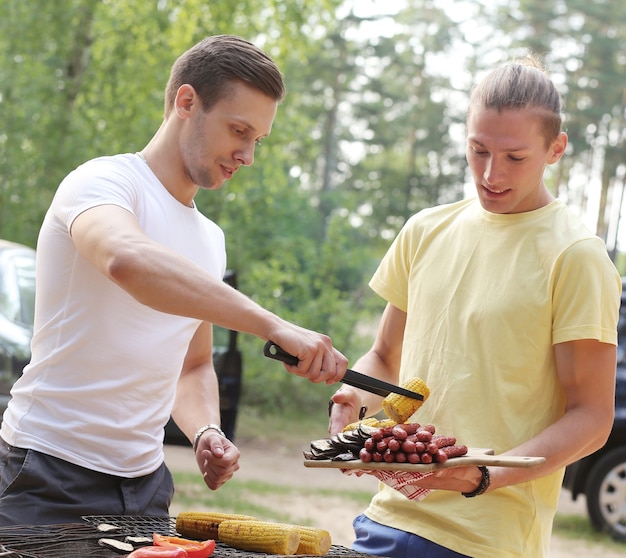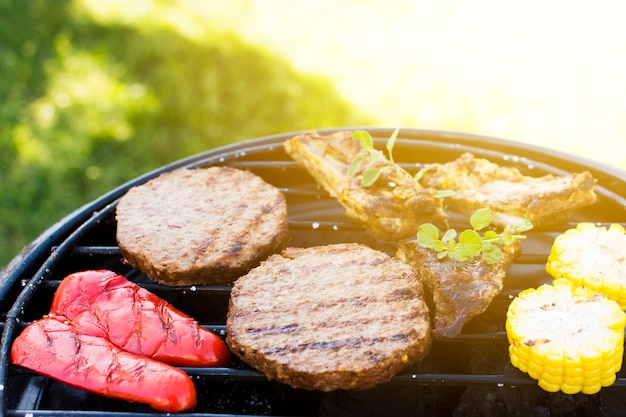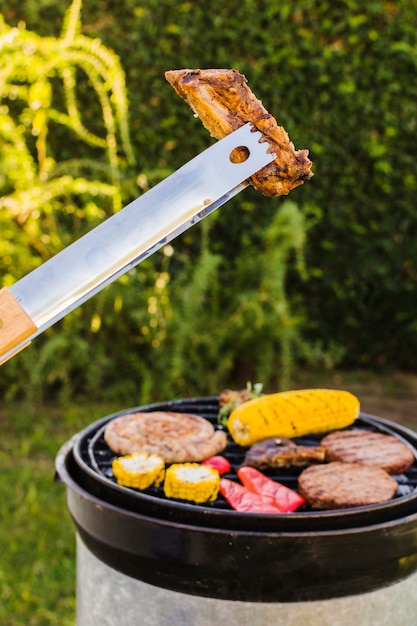Do you grill burgers with the lid open or closed?
Whether you’re a seasoned grill master or a casual backyard cookout enthusiast, the question of whether to grill burgers with the lid open or closed is one that often sparks debate. Some argue that grilling with the lid open allows for better heat control and faster cooking times, while others believe that closing the lid creates a more flavorful and juicy end result. So, which approach is the right one? Let’s delve into the factors that can influence your decision.
The Role of Heat Control
One of the key aspects to consider when deciding whether to grill burgers with the lid open or closed is heat control. When grilling with the lid open, you have more direct control over the temperature as you can adjust the flames or move the burgers around with ease. This can be particularly useful when you want to sear the burgers quickly or achieve a specific level of doneness.
On the other hand, grilling with the lid closed creates a convection effect, where the heat circulates around the food, resulting in more even cooking. With the lid closed, you can also trap in the smoky flavors from your grill, creating a delicious and aromatic burger.
The Impact on Moisture and Juiciness
Another factor to consider is the impact on moisture and juiciness. Grilling with the lid open can lead to faster cooking times, which can be beneficial if you prefer your burgers well-done. However, this method may also cause the burgers to dry out more quickly, especially if they are lean.
Closing the lid while grilling can help retain moisture within the patty, resulting in juicier burgers. The trapped steam can help keep the burgers moist and flavorful throughout the cooking process. If you prefer your burgers medium-rare to medium, grilling with the lid closed might be the way to go.
Expert Opinions
“Grilling with the lid open is perfect for achieving a nice sear and char on the outside, while grilling with the lid closed creates an oven-like environment that ensures even cooking and juiciness.” – Chef James Smith, Grillmaster extraordinaire.
Considerations for Your Grill Setup
The type of grill you are using can also play a role in your decision. If you’re grilling on a gas grill, it’s generally recommended to grill with the lid closed to take full advantage of the convection effect and achieve even cooking. However, if you’re using a charcoal grill, grilling with the lid open can allow for better heat control and easier access to the coals.
It’s also worth considering the thickness of your burger patties. Thicker patties may benefit from grilling with the lid closed as it allows for more even cooking throughout, while thinner patties might cook too quickly or risk drying out if the lid is closed for too long.
Should I Grill Burgers on High or Low?
Grilling burgers is a popular pastime in the UK, especially during the summer months. However, there is often debate among grill enthusiasts about whether it is better to cook burgers on high or low heat. While both methods have their advantages, knowing which one to choose can make a significant difference in the outcome of your juicy burger.
The Case for High Heat
If you prefer a crispy exterior and a juicy interior, grilling burgers on high heat may be the way to go. The intense heat sears the outside of the patty quickly, locking in the juices and creating a flavorful crust. This method is ideal when you are looking for a quick and easy meal that still delivers great taste.
Tip: Keep an eye on the burger as it cooks on high heat, as it can easily burn if left unattended.
The Benefits of Low Heat
On the other hand, cooking burgers on low heat allows for more even cooking throughout the patty. This method gives the fat within the burger more time to render, resulting in a moist and tender burger. Additionally, low heat cooking is perfect for thicker patties or when you prefer a more well-done burger.
Tip: To achieve a perfectly cooked burger on low heat, use a meat thermometer to ensure it reaches an internal temperature of 160°F (71°C).
“The choice between grilling burgers on high or low heat ultimately depends on personal preference. Experiment with both methods to find the one that suits your taste.”
Which Method Should You Choose?
Ultimately, the decision between high and low heat grilling should be based on your personal preferences. If you prefer a burger with a nice sear and a slightly pink interior, opt for high heat. On the other hand, if you enjoy a well-done burger with plenty of juiciness, low heat is the way to go.
Here’s a simple comparison table to help you decide:
| High Heat | Low Heat |
|---|---|
| Quick cooking time | Longer cooking time |
| Crispy exterior | Moist and tender |
| Best for thinner patties | Recommended for thicker patties |
Takeaway: Whichever method you choose, make sure to properly prepare your burgers by shaping them evenly and seasoning them adequately for the best results.
Ultimately, grilling burgers is all about personal preference. So next time you fire up the grill, experiment with both high and low heat methods to discover which one produces the perfect burger for you.
Do You Need Non-Stick Spray for Burgers?
Burgers are a classic and delicious choice for a quick and easy meal. But when it comes to cooking burgers at home, you may wonder if you need to use non-stick spray on the grill or pan.
The Benefits of Using Non-Stick Spray
Using non-stick spray can have several benefits when cooking burgers. Firstly, it helps prevent the burgers from sticking to the cooking surface, making flipping and removing them much easier. This is particularly useful when grilling outdoors, as it can be harder to control the heat and prevent sticking.
Additionally, non-stick spray can help reduce the amount of oil or fat needed to cook the burgers. By using a minimal amount of spray, you can still achieve a deliciously juicy burger without excess grease.
When to Use Non-Stick Spray
While non-stick spray can be helpful, it is not always necessary when cooking burgers. If you are using a high-quality non-stick pan or grill with a good seasoning, your burgers are less likely to stick. In these cases, you may not need to use non-stick spray at all.
However, if you’re using a new or less well-seasoned cooking surface, or if you’re cooking burgers with a high fat content, using non-stick spray can provide an added layer of insurance against sticking.
Tips for Using Non-Stick Spray
If you do choose to use non-stick spray when cooking burgers, here are a few tips to keep in mind:
- Use a light, even coating of spray to avoid excessive buildup or a greasy taste
- Apply the spray directly to the cooking surface, rather than spraying it on the burgers themselves
- Preheat the pan or grill before applying the spray, as this helps to create a non-stick barrier
Remember, using non-stick spray is an optional step when cooking burgers. The choice ultimately depends on your preference and the quality of your cooking surface. Whether you choose to use it or not, enjoy your delicious homemade burgers!
Is it better to cook burgers on direct or indirect heat?
When it comes to cooking burgers, the debate between direct and indirect heat is a common one. Both methods have their own advantages and can result in delicious burgers, but it ultimately depends on your personal preference and the desired outcome.
Direct Heat:
Cooking burgers on direct heat means placing them directly over the heat source, such as a grill or stovetop. This method allows for quick and even cooking, resulting in burgers with a nice sear on the outside while remaining juicy and tender on the inside. Direct heat is ideal for thinner burger patties or when you want to achieve a caramelized crust.
One benefit of using direct heat is the speed at which burgers cook. They can be ready in just a few minutes, making it a convenient option for those short on time. Additionally, direct heat is great for achieving those classic grill marks that add visual appeal to your burgers.
Indirect Heat:
On the other hand, cooking burgers on indirect heat involves placing them away from the direct heat source. This method is typically used for thicker burger patties or when you prefer a slower and more gentle cooking process. Indirect heat allows for more control over the cooking temperature and helps prevent the burgers from drying out.
Indirect heat is also beneficial if you’re cooking burgers with toppings that need to melt, such as cheese or bacon. By using indirect heat, the toppings have time to melt and incorporate into the burger patty without burning or becoming overly crispy.
Choosing the Best Method:
Ultimately, whether you choose to cook burgers on direct or indirect heat depends on your personal preference and the type of burger you’re making. If you prefer a quick and seared burger with a caramelized crust, direct heat is the way to go. On the other hand, if you want a slower and more controlled cooking process with a juicier result, indirect heat is the better choice.
Remember, don’t be afraid to experiment with both methods and find what works best for you!
Here’s a quick summary of the benefits of each method:
| Direct Heat | Indirect Heat |
|---|---|
| – Quick and even cooking | – Slower, more gentle cooking |
| – Achieves a caramelized crust | – Prevents burgers from drying out |
| – Classic grill marks | – Allows toppings to melt without burning |
In conclusion, whether you choose to cook your burgers on direct or indirect heat, the most important thing is to ensure they reach a safe internal temperature of 160°F (71°C) for ground beef. So fire up your grill or heat up your stovetop, and enjoy a delicious homemade burger!
Should you push down on burgers?
Pushing down on a burger while it’s cooking has been a common practice for many chefs and home cooks. But does this technique actually make a difference? Let’s explore whether it’s worth pushing down on your burgers when grilling or frying.
The myth behind pushing down on burgers
Some people believe that pushing down on a burger helps to cook it faster and evenly. The idea is that by pressing the patty, you can remove excess fat and create more contact between the meat and the cooking surface, resulting in a juicier and more flavorful burger.
However, this technique is largely a myth. Pushing down on a burger can actually have negative effects on the overall quality of the meat. When you press down on the patty, you’re essentially squeezing out all the delicious juices, leading to a dry and less flavorful burger.
The science behind burger cooking
When a burger is cooked, the heat causes the proteins to denature and form a network, creating a juicy and tender texture. If you press down on the patty, you disrupt this process and cause the moisture to be squeezed out. Additionally, pressing down on the burger can result in uneven cooking, as the meat loses contact with the cooking surface.
Dr. Patty Expert, a renowned food scientist, explains,
“Pressing down on burgers is unnecessary and can ruin the quality of the meat. Instead, let the patty cook undisturbed for the best results.”
Tips for cooking the perfect burger
If you want to achieve a juicy and flavorful burger, here are some tips:
- Start with high-quality ground beef, preferably with a higher fat content for added flavor.
- Form the patties gently, avoiding over-packing or pressing too hard.
- Preheat your grill or pan to medium-high heat.
- Cook the burgers for about 4-5 minutes per side for medium-rare, or longer based on your preference.
- Avoid constantly flipping or pressing down on the patties during cooking.
Remember, the best way to enjoy a delicious burger is to let it cook undisturbed and allow the natural juices to work their magic. So resist the urge to push down on your burgers and savor every juicy bite!
Should I use butter or oil for burgers?
When it comes to cooking delicious burgers, the choice between using butter or oil can greatly impact the flavor and juiciness of the final result. Both options have their merits, but it ultimately boils down to personal preference. Let’s take a closer look at the pros and cons of using butter and oil.
Butter
Using butter for burgers can add a rich, creamy flavor and enhance the overall taste. It also helps to create a mouth-watering caramelized crust on the outside of the patty. However, butter has a lower smoke point compared to oil, which means it may burn if used at high heat. To prevent this, consider using a combination of butter and oil, where the oil helps raise the smoke point and provides a higher temperature tolerance.
Oil
Using oil for burgers, such as vegetable or olive oil, is a common choice due to its higher smoke point. This allows you to cook at higher temperatures without worrying about the oil burning. Oil also helps to evenly distribute heat and ensures a crispy exterior while keeping the patties juicy on the inside.
It’s important to note that different oils have different flavors, so consider choosing one that complements the taste of your burger. For instance, olive oil adds a distinct Mediterranean touch, while vegetable or canola oil has a more neutral taste, allowing the other ingredients to shine.
Ultimately, the decision of whether to use butter or oil for burgers depends on your personal taste preferences and desired cooking method. Experimenting with both options can help you discover your favorite way to prepare this classic dish.
“For a flavorful, juicy burger, try combining butter and oil for the best of both worlds!”


